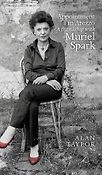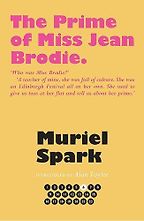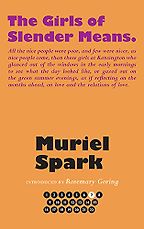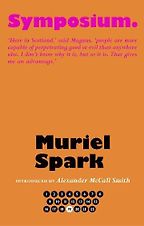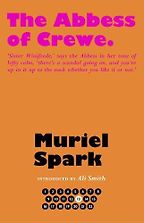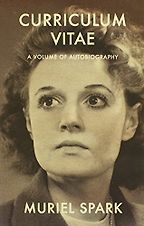Muriel Spark was a unique voice of the 20th century. This year is the centenary of her birth – currently being marked by events in her native Edinburgh and the publication of centenary editions of her 22 novels. Why should we continue to read her work in 2018?
First of all: if you want to be a writer, I can’t think of a better place to start than to read the work of Muriel Spark. Apart from anything else, apart from what her novels say and apart from how entertaining they are, she writes so beautifully. If you have an ear, you might yourself at one point be able to mimic her and become as good a writer. Grammatically, she’s almost perfect.
And yet she has a singular tone of voice. She has style, she has charm, she has wit, she’s profound, she’s serious, she’s religious, she’s political. And – contrary to what some people say – she’s not cruel. She’s full of generosity. She loves her characters. But at the same time, she doesn’t have an iota of sentimentality.
I recently reread an article by the author Carol Shields, in which she said that on first reading she had “mistaken Spark’s amusing style for a lightness of subject matter.” Was that a common misconception? Did it affect the way that Spark’s writing was initially received?
Yes. It’s very interesting that Carol should have said that, because I’ve read several other women writers who have said similar things. Having said that, I have read many men writers who have said much the same thing – but I expected better of the women than I did of the men. That was a sort of typical response. And I am totally and utterly mystified by it.
One of Muriel’s favourite phrases was: ‘and I went on my way rejoicing.’ And so this gives it a sort of jeu d’esprit, a lightness of touch – but you can tell that beneath this was a really serious thinker, who’s thinking about all manner of stuff. But the most serious thing you could say about her, as Stephen Schiff said once in a New Yorker profile of her, is that the main character in all of her novels is God. If that’s the case, how can you mistake her for lightness?
The question of her relationship with God comes up in every profile of Spark. She converted to Roman Catholicism in 1954, three years before the publication of her first novel The Comforters. Should her religiosity be a prism through which we read her writing?
Well, I don’t. Because I take the view that all religion is a nonsense, baloney. And having been brought up a Scottish Presbyterian, I feel that more strongly by the hour. But I guess, with Muriel, you have to say that converting to Catholicism coincided with her becoming a novelist. And therefore that gave her novel-writing some kind of impetus. So you have to regard it.
But you can easily read her novels without thinking: she’s a Catholic. I don’t think you can read Graham Greene’s novels, or many of Graham Greene’s novels, without thinking that he’s a Catholic. But I do think you can do that with Muriel Spark, because she was a very singular kind of Catholic as well.
Get the weekly Five Books newsletter
Richard Holloway – who has written the introduction to her most religious book The Only Problem, which is her take on or thoughts on the Book of Job – says that she is a ‘cafeteria Catholic.’ I think it’s meant derogatorily, but I think it’s a compliment. She would go into a religious café and pick and choose what she wanted from the religion of her choice. And the religion of her choice was Catholicism. She wasn’t a dyed-in-the-wool, traditional, fundamentalist Catholic by any stretch of the imagination. I think she irritated the Catholic Church quite a lot.
But becoming a Catholic allowed her to see what her position was in the universe, and therefore allowed her to approach the page in a different kind of way. Her narrators were omniscient. There’s a reason for that.
Could you tell me a little about how you first came into contact with Muriel. You have written about this in your book Appointment in Arezzo: A Friendship with Muriel Spark.
I met her when I went to interview her in 1990. We met in Arezzo, 15km from where she lived in Oliveto, and we had a very nice, amusing meal and interview. I came back, I wrote the piece and she and her companion Penelope Jardine wrote to me to say how much they’d liked having supper, how much they’d liked reading the piece, and would I like to come and look after their house for a month the following summer? So I did, with my wife and family.
We were in touch over that year, so I got to know her a bit by letter. After we stayed there I used to go and see her four or five times a year, maybe, and we travelled to some places together. We exchanged lots of faxes; no email in those days. I’d say we were kind of simpatico. We have shared backgrounds: we’re from this part of the world, we’re red haired, small, and we believe in revenge.
Let’s talk about your first book choice: The Prime of Miss Jean Brodie. Tell me about it.
It’s a fascinating book for lots of reasons. It is beautifully written and, like The Great Gatsby or The Catcher in the Rye, other slim novels, you can go back to it every year to refresh your memory and you’ll always find something new in it every time. For me, it has a fascination because you have to remember it is set – as Muriel always said – in 1930, when the girls would have been 10, 11, 12 or thereabouts. But more importantly, when Edinburgh was in 1930. So you have the core of it: Miss Jean Brodie, this kind of archetype Scottish womanhood in a way. Why is she called Jean? Most Scottish women were called Jean in those days. ‘Brodie,’ it was assumed, because of Deacon Brodie and the double life of Edinburgh, all that kind of stuff.
Miss Brodie’s fascination with Italy and art was one of the fascinating sides of the book. The other fascinating side of Miss Brodie is her support for Mussolini and his Fascisti. Again, I’m intrigued that a schoolteacher in 1930 could get away with that – but you could. You’ve got to remember that this is very much a period novel. 1930s Edinburgh: what was it like? Well, it was like a lot of other places: it thought Mussolini was on the right track. It was only later that we found out otherwise. So that was fascinating as well – the way Miss Brodie is condemned for her support of Mussolini. Because at that point she wouldn’t really have been looked askance at.
“She’s slippery. Just when you think you’ve pinned her down, off she goes”
I remember hearing just by chance an interview Muriel gave with Jim Naughtie on one of those book programmes on Radio 4. She was there to talk about The Prime of Miss Jean Brodie with listeners. There was a lull in the conversation and Muriel interjected to say to Jim: ‘Would you like to know what I think of the character of Sandy Stranger?’ – Sandy Stranger is the character that betrays Miss Jean Brodie – and Jim blustered, ‘well, yes, it would be interesting to know.’ She said: ‘I think she was a little bitch.’ That just made me gasp.
That really surprises me. I had assumed this was the character that she would have seen herself in.
Well, you were wrong. And many other people were wrong. It’s true that many people thought that Sandy Stranger stood in for Muriel. I think Muriel’s a very difficult person to pin those kind of autobiographical musings on. As Allan Massie says, she’s slippery. Just when you think you’ve pinned her down, off she goes and she’s away. She’s like Bob Dylan, always changing tack. Not always in ways that her readers approve of.
She contained multitudes. But what drew me to that conclusion was the idea that there was this brilliant mind within a character so underestimated. A schoolgirl with a sharp tongue and a burgeoning sexuality – always being described as the ‘dependable one.’
There was an element of that, and of course – this is what I mean – in the Sparkian universe, good and evil are not black and white. There are many, many shades of grey in there. She seems to be cruel and the next minute she’ll be sympathetic. She understood that human beings are complicated beings.
Of all her novels, this was the best known. Do you think that troubled her in any way? Did she yearn to move on?
Well it’s very churlish to think that about a book that has brought you such wealth, recognition and fame. There’s an element of people always wanting her to write another Jean Brodie. As Joseph Heller said when was asked why he had never written another book as good as Catch-22: ‘who has?’
But she used to call The Prime of Miss Jean Brodie her ‘milch cow.’ By which she meant – from Hardy – it kept giving. It was like a fruit machine that cash kept pouring out of. I think she did feel that its ubiquity overshadowed others of the books that she wished had more attention. But in a sense, she was kind of above that. She wasn’t really like the authors of today who are continually on Amazon, seeing how many sales they’ve made and what book festivals they’re appearing at, and how they’re climbing the charts. Of course she wanted people to buy her book, and for them to be publicised properly. But she wasn’t obsessed with what her sales were or how one book was doing against another. All she could do, I think, is go onto the next book and write a better book than the one previously. She was always aspiring to do something different.
I love that book, however I think there are others of her books that are as good as, if not better. And that’s saying something.
Let’s take that as our cue to move onto The Girls of Slender Means. If The Prime of Miss Jean Brodie drew from her experiences at James Gillespie’s High School in Edinburgh, The Girls of Slender Means portrays a group of young women living in ‘The May of Teck Club’, a residential establishment ‘for the Pecuniary Convenience and Social Protection of Ladies of Slender Means below the age of Thirty Years.’ Spark lived in a similar situation in Lancaster Gate when she first moved to London after her divorce. Not a hostel, exactly –
It was kind of like a hostel.
Yes.
It’s almost as autobiographical as The Prime of Miss Jean Brodie. Her teacher Miss Christina Kay was very like Miss Jean Brodie. But then, not very like Miss Jean Brodie.
The first thing to say of The Girls of Slender Means is that when I went to London when I was 18, I lived in a male equivalent of this club. These clubs were quite the norm in those days. If you went and worked for the civil service, before you found a flat or your own place to stay, they would find somewhere for you to stay so you could get used to working and the routine of staying in this place. And they were full of fascinating characters, who were doing bizarre things like the girls were doing in The Girls of Slender Means. So I can see where she’s coming from entirely.
I love how the girls share around that one Schiaparelli evening dress between them. It rings true to life.
I always think of The Girls of Slender Means as a sequel of sorts to The Prime of Miss Jean Brodie. Because if you think of the girls in The Prime as around about 10, 11 or so, now they’re in their late teens. They’ve moved away from their upbringing and school and now they’re making their way in the big world. The imperative was to get to London as quickly as you could, and to try to make it there. I went to London thinking I was going to become Dylan Thomas – thank God I didn’t.
Also, like The Prime, it’s set in a closed world. You can manipulate a group of people within a closed world. The other thing is – and she’s unusual in this – for such short novels, her casts were huge. You try to put these things on stage, nobody can afford to do it because you need so many actors and actresses. All these characters have to be extraordinarily delineated. They all have to operate within each other, and then she has to tell a story.
The period I think is totally brilliant.
Right at the close of the Second World War.
Right at the end. And you have this absolutely shocking climax to the book.
It also uses a framing story set in the future – 1963. She often used this technique, jumping in time.
Flash forwards and flashbacks. She was postmodern before the phrase was invented.
Absolutely. In her first novel, the protagonist hallucinates herself being written into the novel.
All it was for her – this is her Scottish Presbyterian sensibility – was just stating the obvious. ‘I’m writing a novel. We know what’s happening, let’s not pretend otherwise,’ you know? So that’s the part of it. It’s not any tricksiness or whatever. It’s like saying, ‘Look: you’re reading a thriller. Of course the novelist knows how the thriller is going to end. So I’m going to tell you how it ends before it’s even begun. So let’s get that out of the way now and get onto more important things.’ That’s absolutely wonderful.
When she appeared at the Edinburgh Book Festival in 2004, I remember a young woman putting her hand up and asking her the question: had she ever been in the situation in which, while writing her novels, one of the minor characters had grown bigger and bigger until he or she began to take over the novel. Muriel just looked askance and said, very quietly: ‘How would that happen?’ She said: ‘I’ve heard of novelists that has happened to. But I’m writing a novel, I’m in charge. So how would it surprise me?’
Could you tell me a little about how she approached the act of writing?
That’s a good question. She had an idea – a pip in the apple – and the idea would germinate. To germinate it, she’d do a lot of reading and research around this amorphous idea. So, she wrote about Lord Lucan in Aiding and Abetting, she wrote about the Watergate scandal in The Abbess of Crewe, she wrote about Mary Queen of Scots in The Finishing School. She’d do a lot of reading about all these subjects. How that pertained to what she was going to then write, how the novel was going to materialise, it’s difficult to tell. But she would do that, she would make notes and think about it. Then there would come a point when she felt she had accumulated enough material, enough detail and enough notes, enough thought, that it was time to ‘pounce,’ as she said.
“She would write the shorter of these novels in a matter of six to eight weeks”
She would have a working title, as novelists always do. Quite often her working titles were no good, as is inevitable, but when she started to write it was extremely concentrated. She would write fast, by hand in Bothwell spiral notebooks she bought in quantity from James Thin’s bookshop in Edinburgh, and more often than not she would write the shorter of these novels in a matter of six to eight weeks. Occasionally when she got stuck, she would make the unusual choice of checking into a hospital in Rome, where the nuns were keen that the people who were there weren’t ill, and she’d get on with writing her novel. She’s the only novelist I know who checked into hospitals to write books.
An extreme sort of writer’s retreat.
It was a good hospital, the private hospital that the Pope used: the Salvator Mundi.
Did the nuns keep the patients in some kind of routine?
No no no, it was pretty much like a retreat. I don’t know too much about the hospital. I once asked her if she ever saw the Pope there. She said: ‘No, but how would I know? He was probably in disguise.’ I think a lot of people who were there were getting plastic surgery.
By and large, the idea was that she would be kept warm, she’d be fed. Her every desire was catered for. You have to remember that – this is quite unusual too – that Muriel was the least domestic person on the planet. Her mother had told her at an early age that if she didn’t learn to do something, no one could ask her to do it. And nobody abided by that as carefully as Muriel did.
This lack of domesticity – now here is an issue with being a female author – people come back to this fact time and time again. There’s a lot of criticism of her, centring upon the fact that she had a small child who did not live with her. As did Doris Lessing – whose youngest children stayed in Africa when she came to London – at roughly the same time. They were both singled out for criticism on this front. Did she feel this keenly, and do you have strong feelings about this?
Doris and Muriel both regretted the fact that when they were in what was then Rhodesia at a particular age, they were only 50 miles apart. Their life there would have been much easier, and much more congenial, if they had known that and known each other. 50 miles in Rhodesia was nothing to travel.
What they think of them as mothers? It actually makes me sick to hear some people talk about them in a way to suggest that they were somehow neglectful, or that they abandoned their children, or that they lacked maternal instincts or whatever. I don’t know exactly the details of Doris’s set up, but I know she looked after her son Peter for many, many years, and with a kind of dedication that was quite outstanding.
“When Doris Lessing and Muriel lived in Rhodesia, they were only fifty miles apart”
In Muriel’s case, she unfortunately married a man who was probably manic-depressive and had violent tendencies. Nevertheless in Rhodesia, where they had Robin, he was given custody of Robin. And therefore, whether Muriel wanted to look after him or not, she couldn’t. All she could do to protect him was to send him to school where he would be away from her dangerous husband. Then when she finally came back to Britain, she was the only member of the family – including her mother and father at that stage – who was capable of earning a living. And she was only capable of earning a living in her chosen profession as a writer in London.
So what did she do? She took Robin out of her husband’s hands, sent Robin to be brought up by her very loving mother and father, while she got on with earning a living and sending all the money back home. She was like a modern refugee in that sense, working all hours of the day and night, in extreme circumstances, to send them money. How that’s neglectful, I don’t know. Now that isn’t to say that Robin didn’t feel neglected, he did. But that’s his problem.
As Jenny Diski has pointed out in the case of Doris Lessing, this pattern of behaviour you see time and time again in male writers and men of all descriptions. And that is never remarked upon.
It’s never is. And one of the other things that’s also never remarked upon is – and I don’t want to come over as some kind of crypto-feminist, or whatever, it’s just straight forward as far as I’m concerned – that the 1950s is meant to be the decade of the Angry Young Men. Well, they’re all pretty ordinary writers. Whereas the decade of the 1950s was the decade of Nadine Gordimer, Iris Murdoch, Doris Lessing, Brigid Brophy, Elizabeth Taylor, Muriel Spark, and on and on and on you could go. Nobody seems to think this is remarkable. Least of all, academics!
Do you think Spark deserves more academic attention?
Well, I don’t think anybody deserves that kind of attention. I mean, she might have done previously, but I think this generation of academics is pretty uninspiring. They’re basically phenomenon spotters. They can’t spot whether anything’s any good or not, they can’t tell whether a sentence sings, or dies like a bell that’s lost its tone.
Let’s move onto Symposium, a wonderfully lively novel which centres around a dinner party in Islington. Main events do take place in cutaways, but in essence it’s a closed-room scenario.
Yes, it’s a book where actions and words, the things people do and say, have consequences. So there’s that level. It’s a real juggernaut of a title for Muriel to choose. Normally she chooses catch phrases and familiar phrases… maybe she felt there was a certain irony in calling it Symposium, but you can’t not give it a nod to Plato’s Symposium. It’s also the only other of her novels – the first being The Prime of Miss Jean Brodie – that’s at least partly set in Scotland. It features a madman, Magnus. This is another aspect of her that’s not remarked on. She was very sympathetic towards, and very straight-forward about, people with dementia, as she was in Memento Mori. And here she gives a starring role to a man who’s not certifiably sane.
When I met her, she’d just written Symposium, so we could talk about it quite a lot. She asked what I thought, and I said ‘I like it very much, but is it probable that someone like Magnus would be allowed out from a ‘bin’ – as she called it – ‘to advise the family on how they should run their affairs? Does that kind of thing happen?’ And she said, ‘oh, it does in St Andrews.’ She was convinced that these things had happened, and of course for a novel to happen you only need one instance of the thing, it doesn’t need to be a phenomenon. If it could happen to one person, it’s worth writing a novel about. It’s got a lovely feel to it, wonderful phrases and sayings. It was her nineteenth novel, written when she was about 72.
There is a character in Symposium, Margaret, whose past dealings with nuns at the Convent of Good Hope make up probably my favourite parts of the book. It’s so scandalous, so full of life. And a convent is the setting of your next choice, The Abbess of Crewe: an allegorical novel about Watergate.
Yes. This was a novel written as events were unfolding. Another thing people forget about Muriel Spark is how politically savvy she was. She was an avid reader of newspapers, as many novelists are, and a great follower of international news. She always kept up with current affairs. She was fascinated by the unfolding story of the break-in at the Watergate building, and the downfall of Richard Nixon.
She has an essay, ‘The Desegregation of Art’, in which she talks about how we need to move away from the idea of ‘good’ and ‘bad’ art. There’s this idea that people go to the cinema and watch a film about racism in the south or something, and then they come out feeling good, thinking, ‘Yes, we’ve nailed it. Let’s get rid of racism.’ But that’s the point at which their concern stops. She thought that the only response to bad things happening was satire, and by sending them up and mocking them and pillorying them you could probably deal with them, and that’s what she does in The Abbess of Crewe.
I love the setting, a convent where things have gone completely awry. The only nun who can sort out the mess is touring the world, sorting out other people’s problems. That nun is modelled on Henry Kissinger. They’re always phoning her saying: ‘Come back! We need you to come back!’ and she says, ‘I will come back, just when I’ve sorted this out… when I’ve sorted that out.’ It’s a brilliant, brilliant satire.
And again: it’s a closed society.
And another example of these morally complex characters. Given that they’ve ostensibly devoted themselves to God, one might expect them to be above all this.
I know, but they’re not. Even the slightest acquaintance with what we might call ‘divines’ will tell you that that is just an absurdity. I met my fair share of priests and ministers – not nuns – and anyone who says that these are stable, sane human beings, whose minds are on higher things all the time, is living in cloud-cuckoo-land. They’re as venal and guilt-laden as the rest of us, perhaps more so. And I think especially in the case of nuns and priests, because they’ve taken this mad vow of celibacy, where it confines their lives to one of denial.
The book reinterprets the events of Nixon’s downfall as farce. The nun at the heart of the scandal says: “There’s one particular tape in which I prove my innocence of the bugging.”
It’s fantastic. The convent’s completely bugged. The trees are bugged. Everything’s bugged. In a way, this is what it’s meant to be like in a religious world. Everything you or I say do being bugged – God is listening. If you say something now, then when you get to those gates, He’ll say: ‘I remember you said X, on such-and-such a date.’
Spark kept almost every scrap of paper that came her way for many decades. A recent BBC documentary suggested that the motivation for keeping such a detailed archive was her fear about her own mental health. Do you agree?
No. My take on that is that she felt betrayed by several people – principally men – who had said she’d done things or said things or been somewhere on a particular date at a particular time. And she was fed up of these lies. She wanted to put a stop to it, and did it in the most paranoiac way – by keeping all these pieces of paper.
When I stayed at the house, the files marched across the walls. There were hundreds of them, all carefully sorted and labelled. This was her way of keeping track of things. It was to a level that most of us would find untenable. But then… if you’ve had any dealings with the income tax people, you get to thinking, maybe I should keep them. She had all these problems with income tax people, landlords, publishers, you name it. If she needed to, she could go to the file and say no: here’s the proof.
That probably brings us to your final book choice, Curriculum Vitae. A memoir that addresses the years up until the publication of her first novel.
Until “…I go on my way rejoicing.”
Exactly. These were the troubled years. The official biography of Spark, by Martin Stannard – a book I understand she did not like very much – was billed as a Cinderella story, of sorts. Did she see her life in these terms?
No! She was a completely unsentimental person. Women should use her as a role model. She had tough times. She’d been very hard up. She’d been ill. She’d not been well off. But I think she just thought it was part of the struggle. In her mind, she always knew that all this experience was good experience, bad or good. Her marriage is a case in point. On a personal level it was a disaster from the point of view of a novelist it was priceless experience.
I think she didn’t know how she would use it, because until she wrote The Comforters in 1957, she regarded herself as a poet. I think what changed that was winning The Observer short story competition, which she talks about in Curriculum Vitae, and the fact that you could earn a living writing prose. Also, and this will hurt most novelists who read this, she found it comparatively easy to write novels. She was surprised by how easy it was. She probably thought, I can go on writing novels like this, no trouble at all, and I’ll still be able to write poetry.
Why did she decide to write her memoirs?
To stop these lies hopping about “like fleas.” She was continually irritated by people who’d write biographies, say, of other people, and she would have a small part in it. She would read the little paragraphs or so and find them completely riddled with errors. And when she complained to the writers of these biographies, they would say, ‘what does it matter?’ That would just drive her insane with anger. Because it did matter. Get it right, if you can. God knows, we all make mistakes, but the motivation should be to get it right to begin with.
She wanted to write about her upbringing and childhood in Edinburgh, because again, we have a very odd view of the past. It’s very difficult to capture it, so she approached it in a Proustian manner – through memory and objects and food – and tried to recreate it. But even then, it’s almost impossible to do. I love Curriculum Vitae, and think it’s much more pungent than many critics thought it was. It’s laced with wonderful stuff.
“On a personal level the marriage was a disaster, but for a novelist it was priceless experience”
From what I’ve learned about Edinburgh in those years, especially among the Jewish community of Edinburgh, it was a pretty dark, hard, poverty-stricken place. Her family wasn’t the most poverty stricken, but they weren’t far from it.
She did say of the film of The Prime of Miss Jean Brodie that the one thing they had gotten wrong was that the Edinburgh was too colourful. It was much greyer, in her experience, she said.
That was undoubtedly true. When I was growing up in Edinburgh, in my late teens or early twenties, it was quite a different place. And that’s not so long ago. I worked in the Central Library’s reference department, and I could leave the library at night, walk all the way down The Mound, and smell the breweries and the smoke in the air, a pewter coloured sky, there’d be no traffic, no people, and I’d go to the Abbotsford bar and sit there with Norman MacCaig for an hour and a half, and we might be the only two people there. That’s impossible now, at any hour of the day! I remember Edinburgh nights, when you’d leave the library when it had been snowing, and it was just absolutely magical. What a gorgeous, beautiful city.
Muriel said that Scotland was the formation of her. But did she need to leave Edinburgh to become a writer?
I think so. If you think back – how would she have made a living here? I don’t think even avid readers could name many female poets and novelists in Scotland in the 1940s, 1950s, 1960s. It was a very male dominated profession. At the same time, there weren’t the number of magazines where you could write and make a living that way. Publishing was in the doldrums, so if you wanted to be published you had to go to a London publishing house, as they were the only ones who could sell your books outside Scotland.
Finally, the London Review of Books remarked of Curriculum Vitae: “In her autobiography as in her fiction, Muriel Spark is not a person but a persona.” Is that something you recognise?
I think that’s the sort of thing people say when they have nothing to say. Of course she was a person. You might not like that person, or think that’s a person you should be wary of, but it’s a person who seems incredibly honest, who knew her own worth, who had a real wit – that line that she said about Marie Stopes, for example: “I used to think it was a pity that her mother rather than she had not thought of birth control,” that’s pretty tart. Is that a persona? No!
Interview by Cal Flyn, Deputy Editor
March 2, 2018
Five Books aims to keep its book recommendations and interviews up to date. If you are the interviewee and would like to update your choice of books (or even just what you say about them) please email us at [email protected]
Five Books interviews are expensive to produce. If you've enjoyed this interview, please support us by donating a small amount.

